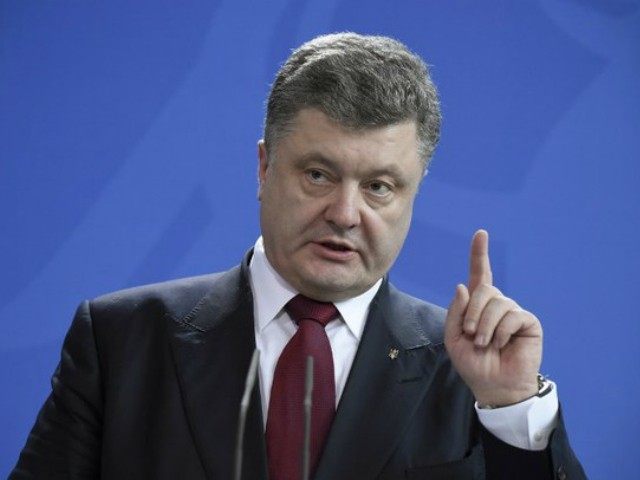President Petro Poroshenko of Ukraine has invited America’s president-elect, Donald Trump, to visit his nation “at the earliest convenience,” according to Kiev, in a phone call on Monday.
“President of Ukraine congratulated the President-elect on winning the presidential election and emphasized readiness to work with Trump’s administration and to further strengthen the Ukraine-U.S. strategic partnership,” the Ukrainian government announced. “Petro Poroshenko also stressed the need for the Washington’s resolute support of Ukraine in countering the Russian aggression and implementing crucial reforms.”
The two sides agreed to hold a bilateral meeting, though it was not immediately clear whether this meant that Trump would visit Ukraine or whether Poroshenko would meet Trump in Washington. The two may also meet in a variety of multilateral summits peppered throughout the year — most prominently the UN General Assembly meeting, which occurs every year in September.
The call occurred hours after Trump held a similar talk with Russian President Vladimir Putin. The government summaries of that call mirrored those of the Poroshenko call: a congratulations on winning the election and promise to strengthen the bilateral alliance. Trump and Putin reportedly discussed “a range of issues including the threats and challenges facing the United States and Russia, strategic economic issues and the historical U.S.-Russia relationship that dates back over 200 years.”
“Countering Russian aggression,” the topic Poroshenko hoped to cooperate with Trump on, clearly places the president-elect at odds with policies that would strengthen the “historical U.S.-Russia relationship.” It is among the many complex issues Trump will have to face as he receives congratulatory greetings from the world’s heads of state, and comparable to another set of calls Trump has held since winning the presidential election last week: those with Chinese President Xi Jinping and Japanese Prime Minister Shinzo Abe.
Abe may be the first head of state Trump meets in person, as the two agreed to meet on Tuesday. Trump nonetheless reportedly agreed to work with Xi on strengthening the U.S.-Chinese relationship. These two interests came to a head numerous times during the Obama administration, most notably in 2013, when a belligerent communist China established an Air Defense Identification Zone (ADIZ) over Japan’s Senkaku Islands. While the ADIZ still stands, it remains mostly unenforced due to President Barack Obama reminding Beijing the U.S. is treaty-bound to defend the Japanese should China’s military attack unidentified aircraft.
In Ukraine, Trump may face a similar parsing of competing interests. Putin invaded Ukraine in 2014, first by aiding “separatist” groups clearly loyal to the Kremlin, then by placing formal Russian assets in the region. In March of that year, Putin declared that the Ukrainian province of Crimea was now Russian and has since colonized it by moving military assets into the area.
Putin continued to amass territory, in a similar fashion to his invasion of Georgia in 2008, in which he employed the use of “separatists” to destabilize the breakaway regions of Abkhazia and South Ossetia. The invasions of both post-Soviet democracies followed a 2005 speech in which he referred to the collapse of the Soviet Union as the “greatest geopolitical catastrophe of the century.”
Following the Ukraine invasion, the Obama White House advised Kiev to “avoid confrontation” with Putin. With the death tolls mounting, and the damage to Ukraine’s territorial integrity highlighted in dramatic fashion by Russian allies shooting down a commercial aircraft using Russian military equipment over Ukraine in 2014, President Obama faced growing clamor to do more to curb Putin at home.
“I think we ought to be providing military aid to the Ukrainians. I think we ought to be bolstering NATO. I think we ought to be doing everything we can to provide other energy supplies so that Russia isn’t the only country that provides energy to those countries in that part of the world,” former Secretary of Defense Leon Panetta said in February 2015.
A more sympathetic former Secretary of State Madeleine Albright said in the same month, “I hope the president does see the value of letting the Ukrainians defend themselves, but I also understand the difficulty of making the decision. The Russians are clearly arming the separatists.” A group of U.S. Senators led by former Obama presidential rival Sen. John McCain urged President Obama to formally arm the Ukrainian government.
In March of that year, President Obama approved a $75 million appropriation to buy the Ukranian government “non-lethal” Humvees.

COMMENTS
Please let us know if you're having issues with commenting.